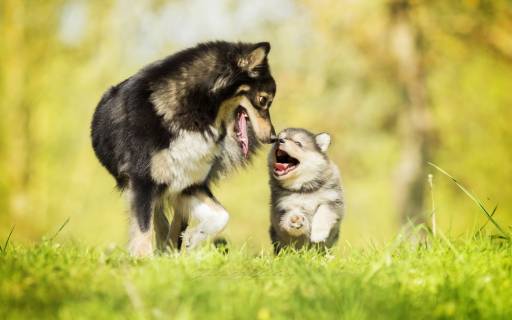Connect with a verified veterinarian in minutes. Licensed vets are available 24/7 to answer your questions. No need to worry about your furry family member.
Puppies are the cutest things to us! How can you feel sad when watching an adorable puppy playing and romping around? Even the very thought brings a smile to your face! However, not everyone finds puppies adorable, including some male dogs. Some male dogs dislike their puppies. But why?
Does your male dog dislike his puppies? Are you worried about your male dog’s behavior? If so, you’ve come to the right place. We understand this behavior can be concerning and scary.
We’ve put together some information about why male dogs may not like their puppies. Let’s get started!
Do Male Dogs Recognize Their Own Puppies?
In most cases, male dogs don’t seem to have paternal instincts toward their puppies. Even though male wolves do care for their pups, domesticate male dogs don’t care for the puppies or raise them. The difference may be that once the male dog has impregnated the female dog, he’s no longer needed.
When the puppies are born, the mother takes care of them right away. She feeds and cares for the puppies as she raises them. There’s really no need for the father to protect his litter. On the other hand, male wolves are there to protect the mother and the puppies. For domesticated male dogs, there’s no need for their protection.
How Do Male Dogs Act Toward Their Puppies?
It’s important to remember that each male dog is a unique individual and will react differently toward their puppies. Some male dogs may become jealous of the puppies. The mother dog keeps him away and doesn’t want his attention. She’s focused on caring for their puppies. And the humans in the household may also pay more attention to the mother and her puppies. So, the male may begin to feel jealous.

Review symptoms, medications & behavior to keep your pets healthy with a Vet Online in just minutes.
Ask a Vet Live NowJealous Male Dogs & Their Puppies
Jealous male dogs may hide, go off alone, and try to avoid everyone. It’s also possible for the jealous male dog to become aggressive toward their puppies and even try to kill them.
Then there are male dogs who are indifferent to their puppies. They ignore the puppies and show no interest in them.
However, some male dogs are entirely caught up in showing affection to their pups. And sometimes, the mother may also allow the father to help care for their puppies.
Should You Keep the Father Dog Away from His Puppies?
Most experts recommend keeping the father dogs away from their puppies for at least the first 20 days. These first days of life are when the puppies are most fragile. However, after this time, the pups are usually weaned, and the mother may be more comfortable allowing the male to meet his puppies.
So, if the male dog appears friendly and not jealous, it may be OK to allow him to mee his puppies after they’ve been weaned. However, these visits must be supervised. If the mother dog seems reluctant or aggressive, it’s best to remove the male from the area until the puppies are a little older and the mother’s ready for him to be with the puppies.
We’re all for keeping families together; however, in the canine world, it’s best to keep the father dog separate from the puppies for the first three weeks or so. Then you can try short, supervised meetings until everyone is happy and comfortable together!
Connect with a verified veterinarian in minutes. Licensed vets are available 24/7 to answer your questions. No need to worry about your furry family member.

Julie
Julie is a graduate of the University of North Carolina, Wilmington, where she studied Animal science. Though contrary to the opinion of her parents she was meant to study pharmacy, but she was in love with animals especially cats. Julie currently works in an animal research institute (NGO) in California and loves spending quality time with her little cat. She has the passion for making research about animals, how they survive, their way of life among others and publishes it. Julie is also happily married with two kids.
Review symptoms, medications & behavior to keep your pets healthy with a Vet Online in just minutes.
Ask a Vet Live Now

